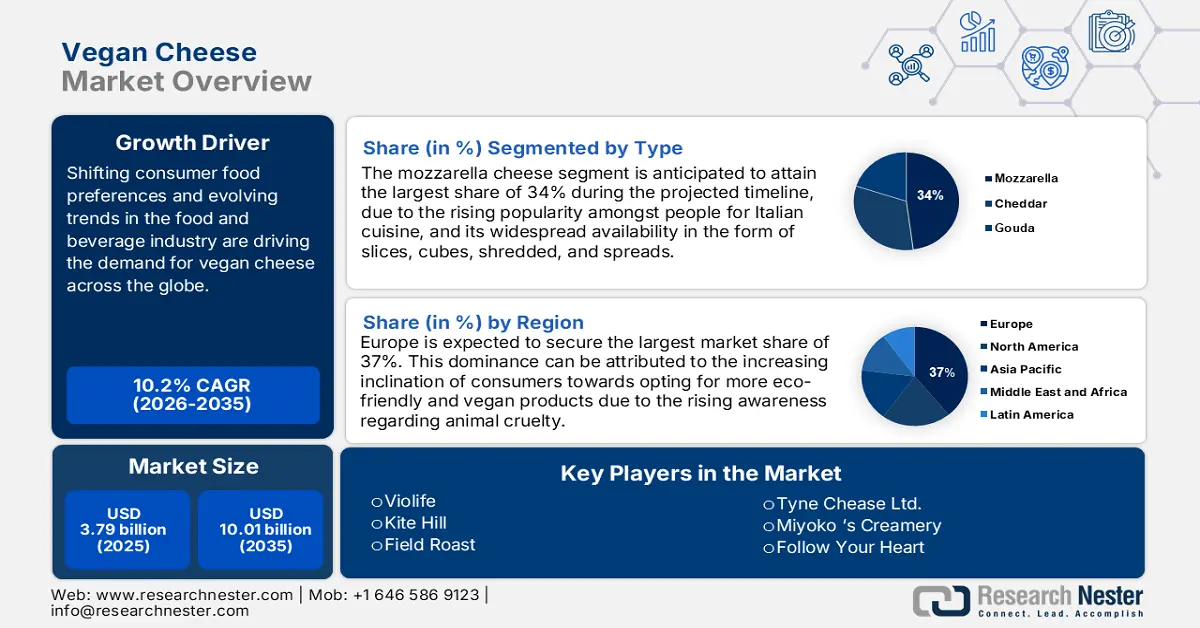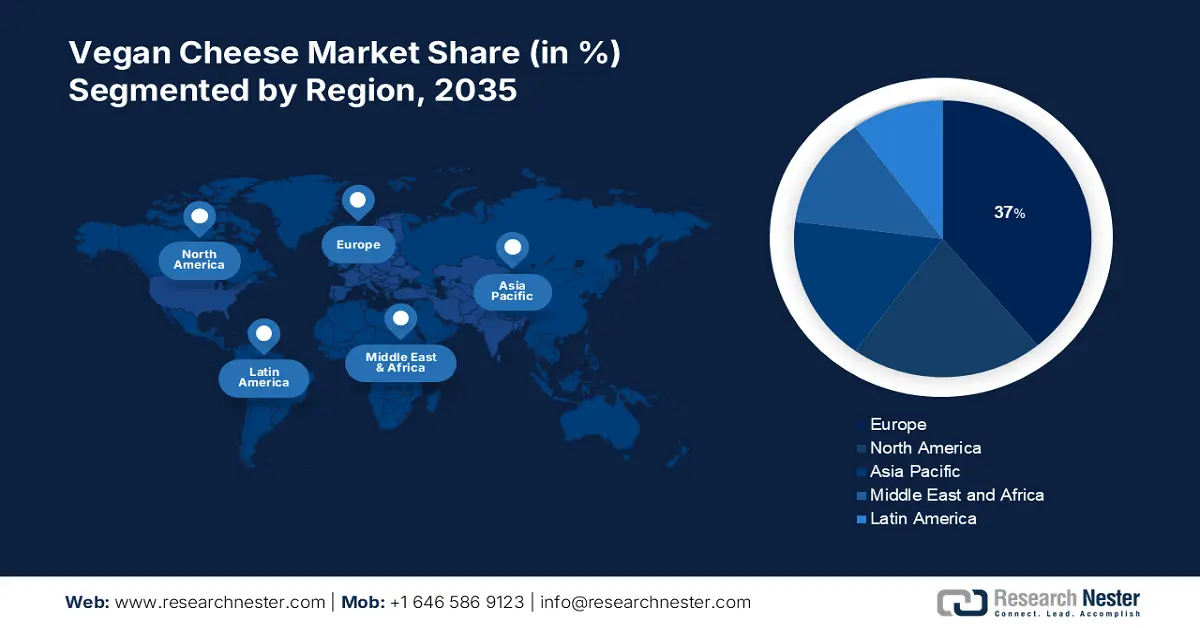Vegan Cheese Market Outlook:
Vegan Cheese Market size was valued at USD 3.79 billion in 2025 and is set to exceed USD 10.01 billion by 2035, expanding at over 10.2% CAGR during the forecast period i.e., between 2026-2035. In the year 2026, the industry size of vegan cheese is estimated at USD 4.14 billion.

Food allergies are one of the most common causes of anaphylaxis, an allergic reaction that can be fatal. Additionally, lactose intolerance is defined by the National Institutes of Health as a decreased ability to digest lactose, a sugar found in milk and other dairy products. The market for plant-based dairy products, such as cheese, is being driven by the rising incidence of lactose intolerance and diary allergy. For instance, the U.S. Department of Health and Human Services estimates that 68% of people worldwide are lactose intolerant, and some people may have a milk allergy.
Increasing market capital and investments in the market are expected to provide potential growth opportunities for the global vegan cheese market in the coming years. In November 2023, Italian food tech company Dreamfarm, a startup focused on plant-based cheese alternatives, announced a total investment of USD 5 million. This investment was previously used to launch an innovative production facility in Sala Baganza with detailed equipment to improve rare and patented production processes.
Key Vegan Cheese Market Insights Summary:
Regional Highlights:
- Europe vegan cheese market is expected to capture 37% share by 2035, driven by the increase in sales of plant-based cheese and dairy alternatives, supported by new product introductions.
- Asia Pacific market will register substantial CAGR during 2026-2035, fueled by the high number of lactose-intolerant people and increasing interest in plant-based milk and dairy products.
Segment Insights:
- The household segment in the vegan cheese market is expected to command a 59% share by 2035, influenced by increasing discretionary income and awareness of health concerns related to dairy.
- The mozzarella segment in the vegan cheese market is projected to capture a 34% share by 2035, driven by rising consumer preference for plant-based mozzarella due to health and allergy benefits.
Key Growth Trends:
- Growing Number of Product Launches
- Growing Trend for Veganism
Major Challenges:
- Expensive As Compared to Dairy Cheese
- Nutritional Concerns Associated with Cheese is Anticipated to Hamper the Market Growth in the Forecast Period
Key Players: Miyoko’s Creamery, Vermont Farmstead Cheese Co, GOOD PLANeT Food, Parmela Creamery, Tyne Chease Ltd, Field Roast, Follow Your Heart, TOFUTTI BRANDS, INC.
Global Vegan Cheese Market Forecast and Regional Outlook:
Market Size & Growth Projections:
- 2025 Market Size: USD 3.79 billion
- 2026 Market Size: USD 4.14 billion
- Projected Market Size: USD 10.01 billion by 2035
- Growth Forecasts: 10.2% CAGR (2026-2035)
Key Regional Dynamics:
- Largest Region: Europe (37% Share by 2035)
- Fastest Growing Region: Asia Pacific
- Dominating Countries: United States, Germany, United Kingdom, Canada, Australia
- Emerging Countries: China, India, Japan, South Korea, Singapore
Last updated on : 16 September, 2025
Vegan Cheese Market Growth Drivers and Challenges:
Growth Drivers
- Growing Number of Product Launches - Increasing adoption of new plant-based cheese products by various market players is expected to drive the growth of the global vegan cheese market. In this regard, in June 2023, Korean food technology company Armored Fresh developed a new vegan cheese called "American Slice" made from oat milk that is free from nut allergies. This advancement is part of the growth of food distribution in the United States. Similarly, in November 2023, Laughing Cow disparaged its leading vegan alternative in UK supermarkets. Laughing Cow's vegan variety is made from almonds and has exactly the same spreadable consistency as the original cheese. Additionally, it is clear that it will trade in a triangular shape, similar to the company's existing products.
- Growing Trend for Veganism - Millennials' trend toward veganism and vegetarian diets is expected to drive industry growth in the hotel/restaurant/café sector. Over 10% of US adults identify as vegan or vegetarian. According to data, there are approximately 79 million vegans worldwide. Again, trade in plant-based foods grew three times faster than global food sales in 2021, according to the Good Food Institute. Instances of plant-based foods associated with these results include milk, eggs, cheese, meat, yogurt, butter, and cream.
Challenges
- Expensive As Compared to Dairy Cheese - Ingredients such as nuts and seeds and energy-intensive production approaches make plant-based cheeses more expensive. Manufacturers are still unable to mass produce and there is no government financial support for plant-based products. Additionally, additional fortification with vitamins and minerals is a must. The high price of plant-based cheese is due to the complicated manufacturing process. Dairy alternative sources such as soy, cashews, and almonds can be expensive.
- Nutritional Concerns Associated with Cheese is Anticipated to Hamper the Market Growth in the Forecast Period
- Taste and Texture Complication Associated are Expected to Pose Limitations on the Market Growth in the Upcoming Period
Vegan Cheese Market Size and Forecast:
| Report Attribute | Details |
|---|---|
|
Base Year |
2025 |
|
Forecast Period |
2026-2035 |
|
CAGR |
10.2% |
|
Base Year Market Size (2025) |
USD 3.79 billion |
|
Forecast Year Market Size (2035) |
USD 10.01 billion |
|
Regional Scope |
|
Vegan Cheese Market Segmentation:
Type Segment Analysis
In terms of type, the mozzarella segment is anticipated to dominate the vegan cheese market with 34% share by the end of 2035. Plant-based mozzarella cheese is often used in applications such as pizza and some pasta dishes, but it can also be found in salads, nachos, and more. The main ingredients used to make vegan mozzarella cheese are also a great alternative for consumers with allergies or lactose intolerance. Moreover, most of the big pizza restaurants like Domino's use pure vegan mozzarella cheese. The use of cashews in the production of mozzarella cheese gives it an incredibly creamy texture. Being cholesterol-free, meatless mozzarella cheese is more widely used by those who have high cholesterol. Due to its dairy-free nature, vegan mozzarella cheese blocks are more likely to be tolerated and absorbed more easily by people with digestive issues. The use of plant-based mozzarella cheese in the food sector is expanding as more and more people are choosing to maintain healthy lifestyles by reducing the fat and calorie content of various food products, such as pizzas, which have approximately 280 calories. This trend reduces the amount of calories in food products.
End Use Segment Analysis
In terms of end use, the household segment share in the is estimated to cross 59% by the end of forecast period. In the case of households, as a result of an increasing level of discretionary income and higher levels of interest in spending on quality food products, demand for plant-based cheese has risen. While the trend in household consumption is also indicative of increasing awareness about different health concerns associated with dairy cheese and milk products, this has led to an increased demand for plant-based substitutes.
Our in-depth analysis of the global market includes the following segments:
|
Type |
|
|
Form |
|
|
Protein Source |
|
|
End Use |
|
|
Flavor |
|
|
Sales Channel |
|

Vishnu Nair
Head - Global Business DevelopmentCustomize this report to your requirements — connect with our consultant for personalized insights and options.
Vegan Cheese Market Regional Analysis:
European Market Insights
The vegan cheese market in the Europe region is poised to hold 37% revenue share by 2035. According to a report from the EU-funded SMART PROTEIN project, the Netherlands has taken the lead in selling plant-based cheese. The project examined retail data from 11 European countries to pinpoint how much plant-based consumption increased in the region from 2018 to 2020. The growth rate is 400%. Additionally, in Europe, sales of dairy alternatives increased by 49% between 2020 and 2022, according to the Good Food Institute. This is due to an increase in new product introductions to the European market. Such as, in January 2023, his startup Väcka developed a plant-based cheese using an unlikely ingredient: fermented melon seed milk. Additionally, Amsterdam-based cheese company Willicroft acquired plant-based cheese in May 2022 and sold it to British dairy farms. They bring plant-based, eco-friendly cheese to the European masses.
APEJ Market Insights
The Asia Pacific vegan cheese market is set to grow substantially through 2035. Regional market growth is driven by the presence of a high number of lactose intolerant people, as well as an increasing interest in alternative plant milk products. For instance, since 2020, plant based milk and alternative dairy products have experienced significant growth, with a nearly 60% increase in plant based milk and alternative dairy products, according to a comprehensive industry report on the increasing popularity of plant based diets and products in Australia by the Grains and Legumes Nutrition Council.

Vegan Cheese Market Players:
- Violife
- Company Overview
- Business Strategy
- Key Product Offerings
- Financial Performance
- Key Performance Indicators
- Risk Analysis
- Recent Development
- Regional Presence
- SWOT Analysis
- Kite Hill
- Miyoko’s Creamery
- Vermont Farmstead Cheese Co
- GOOD PLANeT Food
- Parmela Creamery
- Tyne Chease Ltd
- Field Roast
- Follow Your Heart
- TOFUTTI BRANDS, INC.
Recent Developments
- Violife entered into a partnership with Quantis to analyse the level of carbon emissions from vegan cheeses compared to dairy cheeses. According to the study, a 50 per cent reduction in carbon emissions would be achieved if we moved towards dairy free cheese. Further research showed that, in comparison to the emissions of pigs, chickens and eggs, dairy cheese is one of the major greenhouse gas contributors.
- Miyoko's Creamery has announced that they have introduced plant milk cheese spreads, which are tasty additions to their line of sweet products. All the new spreads are created from a rich and creamy base of organic cultured cashew milk using traditional cheese making techniques. These plant milk cheese spreads, inspired by the award winning, best artisan selling cheese wheels and Roadhouse Cheddar, are a snack that is sure to ignite spontaneously.
- Report ID: 5558
- Published Date: Sep 16, 2025
- Report Format: PDF, PPT
- Explore a preview of key market trends and insights
- Review sample data tables and segment breakdowns
- Experience the quality of our visual data representations
- Evaluate our report structure and research methodology
- Get a glimpse of competitive landscape analysis
- Understand how regional forecasts are presented
- Assess the depth of company profiling and benchmarking
- Preview how actionable insights can support your strategy
Explore real data and analysis
Frequently Asked Questions (FAQ)
Vegan Cheese Market Report Scope
Free Sample includes current and historical market size, growth trends, regional charts & tables, company profiles, segment-wise forecasts, and more.
Connect with our Expert
Copyright @ 2026 Research Nester. All Rights Reserved.




